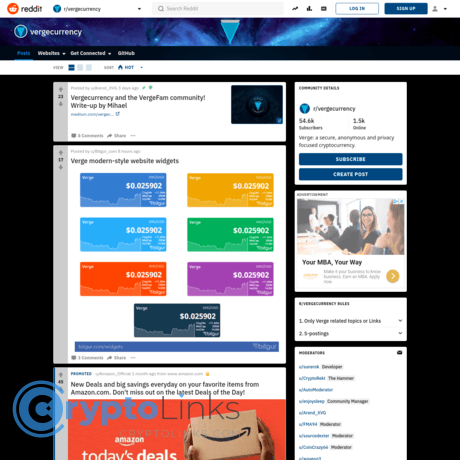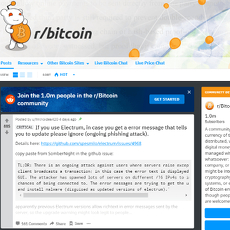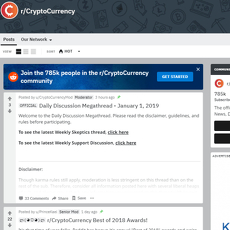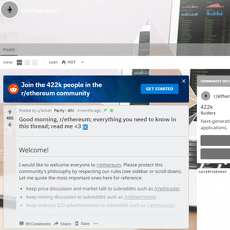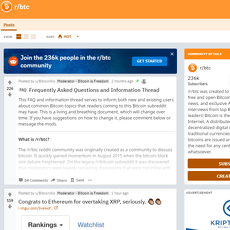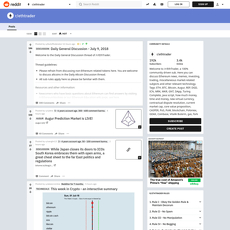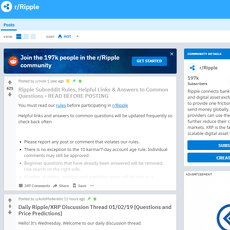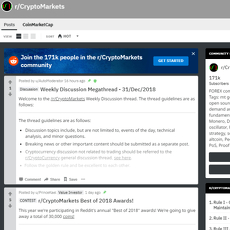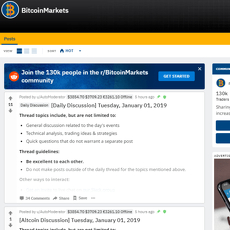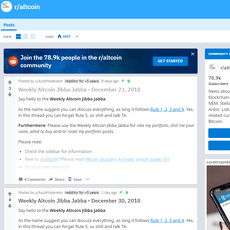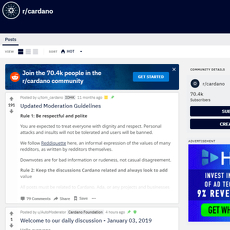r/vergecurrency Review
r/vergecurrency
www.reddit.com
r/vergecurrency Reddit Review: Is It Worth Your Time? What to Read, What to Skip, and How to Stay Safe
Ever open a crypto subreddit, scroll for 10 minutes, and realize you learned nothing except someone’s price target for next week? If you’re curious about Verge (XVG) and wondering whether r/vergecurrency is signal or noise, you’re in the right place.
I keep my reviews simple: what’s useful, what to ignore, and how to squeeze real value from a community without wasting your time or risking your coins.
The problems most readers face on crypto subreddits
Most crypto subreddits—including coin-specific ones—share the same headaches. Here’s what I consistently see, with examples tailored to Verge:
- Too much price talk, not enough proof: “XVG to $1 next month” comments will always outnumber posts with links to code, releases, or signed updates. Studies show sensational claims spread faster than verified facts (see the well-cited MIT study on misinformation spread: Vosoughi et al., Science), and crypto is no exception.
- Outdated posts mixed with real updates: You’ll see a practical wallet fix from last year right beside a fresh release note. Without timestamps and version numbers, it’s easy to follow the wrong steps for Electrum-XVG or node configs.
- Giveaway scams and DM shills: Classic plays include “support” accounts asking for your seed phrase or “send XVG to double it.” This isn’t unique to Verge; Pew finds that people increasingly get news via social platforms and also report confusion about accuracy (Pew Research), which scammers exploit.
- Confusing rules and flair: Some useful posts are hidden behind unclear flairs like “Discussion” when they should be “Support” or “Release.” If you don’t know the flair system, you’ll miss the good stuff.
- Hard to find legit wallet and privacy tips: Verge attracts privacy-minded users (Tor, I2P, stealth practices), but high-signal guides are scattered. You’ll see a solid Tor routing thread sitting under a dozen “When moon?” comments.
Rule of thumb: If a claim affects your wallet, node, or privacy settings, assume it’s unverified until you can match it to an official Verge channel or a signed release.
My promise: a practical, no-fluff way to use r/vergecurrency
Here’s what you’ll get from this guide:
- A quick snapshot of what the subreddit actually does well—and what to skip.
- Simple filters that surface real information fast (so you don’t scroll past the value).
- Where to verify claims before you change anything in your wallet or node.
- Which recurring threads are worth your attention (and which ones aren’t).
- A straight yes/no on whether subscribing makes sense for you.
Who this guide is for
- New or returning Verge followers who want current info without getting lost.
- Privacy-focused users curious about Tor/I2P usage with XVG.
- Wallet users and miners looking for fixes and tested configs.
- Anyone deciding if r/vergecurrency should be a daily source or just an occasional check-in.
Quick verdict in 30 seconds
- Good for: Community updates, practical wallet/mining threads, and quick troubleshooting.
- Mixed for: Price predictions and hype-heavy posts. Treat as opinion, not insight.
- How to use it: Sort by Top (Week/Month) to find standout guides and stickies; check New for fresh support requests and release chatter.
- Safety check: Verify any “update,” “release,” or “fix” against official Verge sources (site, recognized socials, GitHub releases) before acting.
How I evaluated the subreddit
I keep a consistent framework so my take is comparable across communities:
- Activity levels: Post frequency, comment depth, and how quickly questions get answers.
- Moderation quality: Visible rule enforcement, timely stickies, and scam removal speed.
- Signal-to-noise: Ratio of practical guides and verified updates to memes, hype, and price spam.
- Accuracy of technical info: Are wallet and node tips aligned with current versions and official docs?
- Dev or maintainer presence: Even occasional mod/dev commentary can lift accuracy and cut speculation.
- Resource links: Are posts linking to the correct official repos, websites, and checksum pages?
- Helpfulness: Do replies include steps, logs, and version context—or just opinions?
Example signals I look for: recurring stickied posts around releases; support threads where users share Electrum-XVG version numbers and OS details; privacy discussions that reference Tor/I2P setup steps rather than vague assurance; and mods stepping in quickly when a “support” DM scheme shows up.
Now, if you want a tight snapshot of what r/vergecurrency is actually for, how active it really is, and which rules matter before you post or click—ready to see that next?
r/vergecurrency at a glance: purpose, rules, and activity
What r/vergecurrency is (and isn’t)
Think of r/vergecurrency as a practical hub for Verge (XVG) users. It’s where people compare wallet versions, sort out sync issues, share node lists, talk Tor/I2P routing, and flag new integrations. It’s not a place to get signals, private “support,” or guaranteed price calls.
When it’s good, it’s really good. I regularly see threads like:
- “Electrum-XVG stuck at 99%: macOS fix + checksum steps” — with screenshots, OS version, and a link to the exact GitHub release.
- “Mining config that stopped stale shares (Windows/Linux)” — users post their config, pool, and what actually improved hashrate stability.
- “Tor/I2P connection tips for wallet privacy” — routing talk, firewall gotchas, and ISP notes from folks who tested the setup at home.
Expect some price chatter, but the real value lives in technical help and community updates. If a post reads like a promise, not a process, I scroll past it.
“Trust is earned in public threads, not in private DMs.”
Traffic and posting rhythm
The flow is steady with predictable spikes. On quiet weeks, you’ll see a handful of posts a day; during announcements, volumes can jump fast and comment chains get long—support threads often draw the most thoughtful replies. Sticky posts pop up around updates or community housekeeping, and they’re usually worth a read first.
From what I watch, activity clusters around:
- Release chatter — new wallet builds, node instructions, quick fixes.
- Integration news — exchange or merchant updates bring short bursts of attention.
- Troubleshooting hours — US/Europe evenings tend to bring more eyes, which means faster replies when you need help.
If you only have five minutes, scanning the top posts from the past week and any sticky on the front page covers most of what matters.
Rules, flair, and sticky posts that matter
The rules are there to keep you safe and the feed clean. They’re not oppressive, just practical:
- No scams or shills — referral links, “send me coins and I’ll double it,” or off-platform investment chatter gets removed.
- No fake “support” — asking for seed phrases or pushing you to a private chat is not allowed. Report it.
- Stay on-topic — Verge tech, tools, privacy features, and community news are fair game; generic price pumping is not.
- Be civil — helpful beats hostile. The fastest fixes come from threads where everyone stays practical.
Flair is your friend. Labels vary over time, but you’ll usually see something like:
- News — announcements or links to official channels
- Support — wallet, node, or mining help
- Discussion — broader talk and questions
- Mining — pools, configs, performance notes
- Dev/Update — version numbers, repos, and change logs
Sticky posts sit at the top and do a lot of heavy lifting—think “new wallet release and checksum,” “known issues this week,” or “community Q&A.” In research on online communities, pinned resources and clear rules are linked with less spam and better newcomer outcomes; that mirrors what I see here. When a sticky exists, I read it before anything else.
Mod team and community tone
Mods are present and generally quick on the obvious stuff—giveaway spam, fake “support” DMs, low-effort promos. If you report suspicious content, expect action. This aligns with common-sense safety guidance from places like the FBI’s IC3 and crypto crime reports from Chainalysis: scammers try to pull you into private chats. Staying in public threads is your best filter.
The overall vibe is helpful and technical, with bursts of hype when price moves. Most regulars want to fix things, not flame. I’ve watched users spend half an hour walking a newcomer through Electrum settings or Tor routing—no drama, just solutions.
Quick gut-check: if a comment asks for your seed, private key, or remote access, that’s not “support.” That’s the exit sign.
Want to cut the noise and surface only the posts that save you time? In the next part, I’ll share the 60-second setup I use to filter r/vergecurrency so you catch the good stuff first. Curious which view and search strings do 80% of the work?
How to actually get value from r/vergecurrency
If you treat r/vergecurrency like a live feed of tips and fixes—not a prediction casino—you’ll leave with answers instead of anxiety. Here’s the simple, repeatable setup I use to get real signal fast.
“Trust is a currency; spend it slowly.”
Set up your view: Top vs New, and timeframes
I split my browsing into two quick passes. It takes less than five minutes and saves me from scrolling through noise:
- Top (Week/Month) for evergreen gems and stickies:
- Top this week surfaces wallet fixes, mining configs, and mod posts that got real engagement.
- Top this month helps you find guides and release threads that stayed useful longer than a news cycle.
- Skip “All Time” unless you’re collecting references—older posts can be outdated for wallets and nodes.
- New for fresh updates and support threads:
- Filter by flair (Support, News, Discussion) to cut the price chatter.
- Scan titles for version numbers or error codes—those are usually actionable.
My quick workflow: Top (Week) → check stickies → New (last 24h) with Support flair. Done.
Use search and filters like a pro
Reddit search is better than most people think—if you steer it. Use specific keywords and sort the results.
- Smart queries to try (paste these in the subreddit search):
- wallet stuck, electrum error, node peers, tor i2p, mining config, update release
- “checksum” or “signature” when you’re validating a download thread.
- title:release flair_name:"News" to narrow to announcement-style posts (flair matching can be hit-or-miss; use the flair filter buttons if available).
- Sort for signal:
- For fixes: sort by Top and set timeframe to Month.
- For breaking issues: sort by New and scan the last 48 hours.
- Cross-search outside Reddit when you need proof:
- site:github.com vergecurrency release to see if the version in a post actually exists.
- site:twitter.com vergecurrency (or X) to confirm an announcement was mirrored by an official channel.
Tip: on desktop, use the flair “pill” filters under the subreddit banner. On mobile, tap the filter icon and pick the flair you want.
Verify news before you act
Good communities move fast; scammers move faster. Two quick checks can save your coins and your time.
- Match the version number in any “update/release” post with an actual tagged release on the official code repository. If the numbers don’t match, don’t upgrade.
- Check signatures/checksums on wallet downloads. If a thread doesn’t mention these, ask for them publicly. No signatures? Hard pass.
- Look for mirrors: the same news should appear on official website or recognized social channels. If it’s only on Reddit, wait.
Why so strict? In their 2024 report, Chainalysis notes scams remain one of crypto’s largest criminal revenue streams—impersonation and fake “support” continue to trap users who act fast without verifying. And a well-known study in Science found false news spreads faster than truth online. Reddit is better moderated than most platforms, but the risk/reward still favors patience.
Ask smart questions that get answers
You’ll get better help when you make it easy for people to help you. Use this simple template:
- Title: [Support][Wallet] Electrum XVG on Windows 11 – “cannot connect” after restore
- Environment: OS + version, wallet type + version, hardware (CPU/GPU), network (Tor/I2P/clearnet)
- What happened: the exact steps you took—and when
- Error messages: copy/paste or attach a cropped screenshot (hide addresses and IDs)
- What you tried: list specific attempts (changed server, reindexed, different node, restarted Tor, etc.)
- Logs: post a short, safe snippet using code formatting (no seeds, no private keys, no full paths if they reveal usernames)
- Flair: tag it as Support, or Wallet/Mining/Node as appropriate
Example of a great detail to include: “Electrum 4.x.x, tried 3 different servers, Tor is running and reachable, getaddrinfo error persists, started 14:20 UTC.” That’s the kind of specificity that pulls in real answers fast.
Avoid the traps: hype, DMs, and “giveaways”
If it sounds like a shortcut, it’s probably a setup. I treat these as automatic no’s:
- Unsolicited DMs offering “support” or asking to screen-share. Real helpers keep it public.
- Seed or key requests in any form (“verify your wallet,” “airdrop claim,” “sync tool”). Nobody legitimate needs your seed. Ever.
- “Send coins to multiply” giveaways or rapid-fire crossposts hyping a “partnership” without a reputable press release.
- Brand-new accounts shilling price targets or posting shortened links (bit.ly, tinyurl). If you’re curious, expand the link first or just skip it.
Useful hygiene:
- Use the Report button on suspicious posts; choose Scam/Spam so mods see it fast.
- On desktop, hover the link to preview the true domain; on mobile, long-press to peek the URL.
- If you must share system info, consider a fresh throwaway account. Keep your main clean.
Remember: the right answer today beats the perfect answer too late—but only when it’s verified. So here’s the real question: which post types on r/vergecurrency are worth your time, and which are safe to skip without FOMO? Keep reading—I’ll sort the gold from the gravel next.
What you’ll find on r/vergecurrency (and what’s worth your time)
If you’re trying to separate signal from noise, this is where the subreddit actually pulls its weight. Some threads are gold, some are harmless chatter, and a few are landmines. Here’s how I sort it in minutes.
“Trust the code, not the comments.”
Official updates and dev-adjacent posts
These usually look like links to a GitHub release, an exchange integration notice, or maintenance/patch notes. They’re often short, with a link-out and a version number in the title.
- High-signal tells: post is flaired by mods, version matches a tag on GitHub, and there’s a changelog or release notes.
- Dev-adjacent value: contributor summaries of open issues, testnet progress, or RC (release candidate) calls for testing.
- Red flags: mismatched version numbers between the post and the linked release, binaries without checksums/signatures, or links to mirror/file hosts instead of the official repo.
Before you click download, take 30 seconds to sanity-check:
- Compare the version in the title vs the tag on the repo (e.g., vX.Y.Z).
- Look for signed releases and published hashes (SHA256). Verify locally.
- Check the org/owner of the repo. Is it the known maintainers, or a lookalike?
- Scan the comments for early install feedback and OS-specific issues.
Security teams (NIST and most OSS maintainers) recommend verifying signatures and checksums—basic, boring, and the difference between safe and sorry.
Wallet help, nodes, and mining threads
This is the heartbeat of r/vergecurrency. When something breaks or confuses people, you’ll see it here first. Typical patterns:
- Wallet fixes: stuck sync, restore from seed, unexpected fees, “transaction pending,” or electrum-xvg connection errors.
- Node tips: addnode lists, peers.dat resets, reindex/rescan steps, pruning settings, or Tor/I2P proxy parameters.
- Mining help: pool recommendations, stratum URLs, sample .bat configs for ccminer/sgminer, and hashrate tuning for popular GPUs.
What makes these threads useful is the “I tried this and it worked” detail—config snippets, error logs, and OS notes. The risk is copying steps that don’t match your setup. My safe workflow:
- Back up your wallet.dat or seed words before touching anything.
- Match versions: check your OS, wallet build, and the post’s date.
- Test incrementally: change one setting at a time; document what you changed.
- Roll back ready: keep a restore point or copy of your config.
If a post includes commands, confirm they’re not mixing mainnet/testnet or Tor/I2P flags incorrectly. Most issues I see are either version mismatches or proxy typos, not protocol failures.
Privacy features and tooling (Tor, I2P, stealth)
Expect practical, user-led discussions: routing wallet traffic over Tor, locking connections to I2P, split-tunneling, or preventing DNS leaks. You’ll also see walk-throughs on setting up proxies and firewall rules.
- Useful threads: torrc examples, I2P tunnel configs, OS firewall allowlists, and how to confirm traffic is actually routed (e.g., netstat or Wireshark screenshots).
- Trade-offs: Tor/I2P can add latency. If you see “wallet feels slow,” that’s normal. Speed rarely equals privacy.
- Outdated risk: privacy guides age fast. Double-check any years-old Tor/I2P settings on the official docs for Tor or I2P.
Researchers have shown that misconfiguring privacy routing can leak metadata and link activity to your IP, even if you intended to use Tor/I2P. The short version: if a guide doesn’t force proxy use or block clearnet fallback, keep looking.
Market talk vs fundamentals
You’ll see a lot of price noise: “XVG to $1?”, “next bull run,” meme charts with no methodology. That’s fine for sentiment, not decisions.
- Skim or skip: price guesses without sources, screenshots of unnamed indicators, “my cousin’s TA.”
- Worth your time: posts that connect on-chain or dev data to a thesis—release cadence, network hashrate, node count trends, commit activity, or real integrations.
- Simple sniff test: does the post link to a block explorer, GitHub insights, or an official announcement? If it’s just vibes, treat it as vibes.
Upvotes aren’t proof. The best fundamentals posts usually arrive after a code change, when people correlate what shipped with what might matter.
Community initiatives, AMAs, and events
These come in waves: AMAs with devs/mods, wallet testing calls, translation sprints, or event meetups. When a mod or dev is present and the thread is stickied, signal jumps.
- How to get value: show up with one specific question, include your OS or setup, and ask for reproducible steps. You’ll often get cleaner answers than in a general support thread.
- Check authenticity: look for mod flair, stickies, and cross-posts from known accounts before you trust any “official” claims.
- After the AMA: scan for summaries or timestamps—saves time and filters out the noise.
When community energy aligns with a real release or integration, these threads can surface timelines and caveats that don’t always make it into formal announcements.
One last thing—before you click that shiny “new release” link or paste a config someone posted, how do you know it’s safe? I keep a short checklist that prevents 95% of headaches. Want it?
Trust and safety: use this checklist before you click or transact
If you only read one section before sending a single XVG, make it this one. I’ve seen great advice on r/vergecurrency, and I’ve also seen well-meaning posts that were slightly outdated or copied by scammers to look legit.
“If it needs your seed to fix it, it’s not support—it’s theft.”
How reliable is the info here?
It’s mixed—useful, but only if you confirm the details:
- Peer support is solid for wallet installs, node quirks, and mining configs. You’ll often get step-by-step help that works.
- Announcements can lag or use old links. Before you switch wallets or tweak configs, verify version numbers and official mirrors.
- Big claims need proof. If someone posts “New release out!” or “Exchange X integration live!”, check the project’s official site, GitHub releases, and a recognized social channel to match dates and tags.
Why be strict? Because scams ride on trust and speed. The FBI’s 2023 IC3 report shows investment fraud losses hit $4.57B, with crypto frequently involved. Social platforms are a common attack surface, so “trust but verify” isn’t a cliché—it’s survival (source).
Security basics for XVG holders
- Your seed never leaves your hands. Don’t paste it into webforms, Google Docs, Discord, Telegram, “support” chats, or Reddit DMs—ever.
- Keep seeds offline. Write on paper or use a metal backup. Store in two physically separate locations. No screenshots, no cloud notes.
- Verify wallet files before you install:
- Match the SHA256 checksum from the official release page.
- On macOS: run “shasum -a 256 yourfile.dmg”
- On Linux: run “sha256sum yourfile.AppImage”
- On Windows (PowerShell): run “Get-FileHash .\yourfile.exe -Algorithm SHA256”
- If a PGP signature is provided, verify it with the author’s known public key (“gpg --verify file.asc file”).
- Bookmark official links and only use those bookmarks. Don’t trust sponsored ads in search results.
- Update safely: back up your wallet.dat/seed; confirm the version and checksum; upgrade from official sources only.
- Small test sends first. Send a tiny amount to a new address before sending your full stack.
- Clipboard safety: confirm the first 6 and last 6 characters of the address before every send. Clipboard hijackers are real.
- Exchange hygiene: if you use an exchange, enable TOTP 2FA (not SMS), save backup codes offline, and set withdrawal allowlists if available.
- Network privacy ≠ phishing protection. Tor/I2P can hide your IP, but they won’t save you from a fake site. Source matters more than the tunnel.
Red flags to watch for
- Brand-new accounts hyping price or pushing “urgent” downloads.
- DM “support” agents asking for your seed or remote access to your device.
- Giveaway multipliers: “Send 1, get 2 back.” That’s not a promo—it’s a drain.
- Links with no context, shortened URLs, or domains that look “almost” right (letter swaps, extra hyphens, foreign characters).
- Pay-to-unlock traps: “Pay a fee to release stuck funds” or “gas refund” requests.
- Google Docs “wallet recovery forms” or QR codes posted in images. Treat them as hostile until proven safe.
What a scammer DM often looks like:
- “Hello sir, I’m official Verge support. I can recover your stuck transaction—just confirm your 12-word phrase and I’ll process it.”
- “Your wallet is on the wrong chain. Install this patch and log in with your seed so we can resync your funds.”
- “Congrats, you qualify for our XVG airdrop. To claim, send 500 XVG to verify your address.”
None of that is real support. Real maintainers will never need your seed. Period.
Cross-check with official docs and repos
- Use the 3-source rule:
- Official website or docs listed in the subreddit sidebar
- Official GitHub org and signed releases
- One independent aggregator (e.g., a well-known market tracker) to confirm the same links
- Releases: confirm the tag, date, changelog, and checksum on the official GitHub. Check that the uploader matches known maintainers.
- Mobile wallets: verify the publisher’s name, app ID/package name, and the link from the official site. Don’t search the store and guess.
- Mining pools: check fee schedules, payout methods, SSL URLs, and community feedback. Start with minimal hashrate to test stability.
- Config changes: compare any Reddit advice with the README or wiki for your exact wallet version and OS. Mismatched versions cause headaches—and risks.
- Suspicious domain check: paste the URL into urlscan.io or VirusTotal before visiting.
Handy links and tools you may want to keep
- Official sources: {{longresources}}
- Checksum verification: macOS “shasum -a 256”, Linux “sha256sum”, Windows PowerShell “Get-FileHash -Algorithm SHA256”
- Signature verification: “gpg --verify file.asc file” (import the maintainer’s public key from a trusted source)
- urlscan.io to inspect unfamiliar links
- VirusTotal for files and URLs
- Have I Been Pwned to check if your email was exposed
- Wayback Machine to see a site’s history
- Reddit notification settings to reduce DM risks; set “Who can message you?” to people you follow if needed
Still wondering whether Verge itself is secure, or how to sanity-check any update you see on Reddit in seconds? I’m about to tackle the most common questions, straight and simple—want the fast answers?
FAQ: r/vergecurrency readers’ top questions
What is Verge currency?
Verge (XVG) is an open‑source cryptocurrency focused on keeping your network trail harder to track. Instead of promising “magic privacy,” Verge routes wallet and node traffic through anonymity networks like Tor and I2P to reduce IP exposure when you transact or sync. On-chain, Verge has supported stealth-style addressing mechanisms in various wallet builds, but the big idea is this: minimize what an observer can learn about your network location while you use XVG.
If you want a neutral backgrounder with the timeline and major milestones, start here: Verge (cryptocurrency) on Wikipedia. For current components and repos, check the official site and code org:
- Website: vergecurrency.com
- GitHub org: github.com/vergecurrency
Does Verge (XVG) have a future?
Nobody can promise that—especially in crypto. What I do is watch a few non-hype indicators and treat price forecasts as opinions, not facts:
- Development momentum: Are there recent commits, tagged releases, and active maintainers on GitHub?
- Network health: Hashrate trends, node counts, and whether upgrades are adopted quickly.
- Liquidity and access: Exchange volumes, spreads, and reliable fiat/stablecoin pairs.
- Real usage: Wallet downloads, support threads that resolve issues, and integrations that actually work.
Public prediction pages can be interesting to compare narratives, but they aren’t evidence. Example resources:
- Changelly’s forecast posts: Changelly — Verge price prediction
- Exchange price pages: Coinbase — Verge price page
Use them as scenario snapshots, then do your own research. I give more weight to code releases and verifiable adoption than to any chart line.
Is Verge (XVG) a secure coin?
“Secure” isn’t a yes/no—it's layers. A quick way to think about it:
- Protocol and history: Verge has experienced network attacks in the past (time-warp/51% style incidents in 2018), followed by patches and updates. If you want context, here are contemporary reports: CoinDesk (April 2018), CoinDesk (May 2018). Older incidents don’t predict the future, but they’re part of the risk picture.
- Network-layer privacy: Tor/I2P help reduce IP exposure, but they don’t make on-chain data disappear. If you reuse addresses or leak metadata, you can still be profiled.
- Your OPSEC: Most “losses” come from weak device hygiene or phishing, not protocol breaks. Use a clean machine, hardware wallet support if available, strong OS security, and never share seed phrases.
- Wallet integrity: Download only from official links, verify checksums/signatures on releases, and update promptly: GitHub org (check the Releases tab of the core repo).
If you’re tweaking advanced settings (Tor/I2P, peers, pruning), sanity-check instructions against the exact wallet version and your OS. Small mismatches create big headaches.
Where should I verify Verge news or updates I see on Reddit?
I follow a short, strict path before I change anything on my wallet or node:
- Official site: vergecurrency.com — look for a matching post or download link.
- GitHub Releases: Find the current tag, notes, and checksums in the relevant repo (often the core wallet): github.com/vergecurrency.
- Signed or pinned announcements: Cross-check messaging on recognized channels (e.g., X/Twitter) that the team actually controls, ideally with signatures or matching release hashes.
- Community confirmation: In r/vergecurrency, look for stickied mod posts and comments from known maintainers; then verify against the two links above.
Rule of thumb: If a Reddit post isn’t mirrored on the website and the corresponding GitHub release, wait. Good info ages well; scams age fast.
Curious whether subscribing to r/vergecurrency is worth it for your day-to-day workflow? I’ve got a blunt, practical answer—and a checklist you can copy—coming up next. How much time do you actually want to spend each week to stay current without the noise?
Should you subscribe to r/vergecurrency? My take and next steps
Short answer: yes—if you want practical help and a feel for what the Verge community is actually doing day to day. The sub shines for wallet and mining fixes, privacy setup tips, and quick heads-ups, as long as you use filters and verify anything that could affect your coins.
One-sentence takeaway: Subscribe, stick to stickies and Top (Month), treat bold claims as unconfirmed until they match the official site and GitHub, and you’ll get real value without the noise.
Who gets the most value here
- Hands-on users who need fixes fast. If you’re stuck on an Electrum-XVG sync, an I2P/Tor connection quirk, or a mining config, you’ll often find step-by-step comments that solved the same issue for others. Tip: search the sub for “Electrum,” “stuck,” or “peers” and sort by Top (Month) before posting.
- Privacy tinkerers. Threads testing Tor/I2P routing, node peers, and connection hygiene pop up regularly. They’re great for learning what’s working in the wild—even if you still validate against official docs before changing anything.
- New or returning followers. Stickied posts and recent top threads give you a quick pulse on releases, community projects, and common wallet questions without scrolling back years.
When to look beyond the subreddit
- Confirmed releases or security fixes. Always check the official channels. If a post says “New wallet version is live,” open the official site and the Verge GitHub Releases page. No tag, no signed binaries, no checksum? Wait. This protects you from outdated links and impostor downloads.
- Security guidance that changes your setup. For anything touching seeds, keys, or network routing, pair Reddit tips with official docs or well-known security references. CISA’s guidance on software supply chain risks is a good reality check: cisa.gov/resources-tools/resources/software-supply-chain-attacks.
- Price or long-term research. Treat market talk as opinions. For fundamentals, check code activity on GitHub, official announcements, explorer data, and reputable crypto newsrooms. Use Reddit as a discussion layer, not the single source.
Final take and a quick setup that works
Here’s a simple setup I recommend if you want signal without the scroll:
- Subscribe and set your sort. Use Top → Month for context and stickies; scan New when you want fresh help threads or breaking chatter. Save the current sticky to your profile for one-tap access.
- Use a 60-second verification routine. For any “update” post:
open Reddit post → open GitHub Releases → open official site → check tags, signatures, and checksums → only then act. This aligns with standard software integrity practices and helps you avoid supply-chain traps.
- Ask smarter, get faster answers. When posting, include: OS and version, wallet type and version, exact error text, steps you already tried, and whether Tor/I2P is on. Never post seeds or private keys. Clear context dramatically improves community response quality.
- Harden your DM settings. Disable unsolicited DMs, ignore “support” requests that ask for remote access or seed phrases, and report giveaways that promise to “multiply” coins.
- Keep a tiny trust list. Bookmark the sub, the official site, the GitHub Releases page, and any known-good checksum/signature links. That one folder will save you time every month.
If you need a nudge to verify before you click, remember this: research from MIT published in Science found that false news tends to spread faster than the truth on social platforms. It’s not a Reddit-only issue—it’s the internet. A 10-second cross-check beats hours of cleanup. Source: MIT News summary of the 2018 study.
Bottom line: subscribe for the community support and quick tips; pair it with official sources for anything that touches your wallet or security. If you follow the filters-and-verify routine above, r/vergecurrency becomes a helpful feed rather than a distraction.

